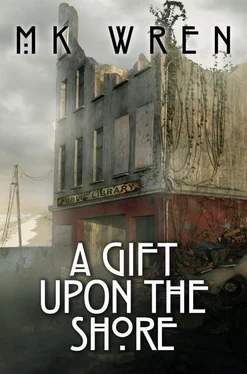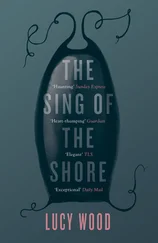Mary Hope considered the relativity of time.
Rather, the subjectivity of it. Her watch informed her that five hours and forty-four minutes had passed since the beginning of the twentieth day of February, that twelve hours and twenty-one minutes had passed since she left her apartment to wait in the hellish limbo of the terminal for a coast bus, that two hours and thirty-six minutes had passed since the bus left Portland. And every one of those hours and minutes, every second of them, she had experienced separately and distinctly. She had learned that boredom and fear can coexist and that they make a mind-racking alchemy.
The fear was the ancient fear of strangers. Too many strangers, any one of whom could be mad. There was no way to know which among the pressing thousands might be over the edge past sanity.
But that was one of the things she was leaving behind.
Her left arm from the elbow up was numb. Laura’s right arm was undoubtedly equally numb where it pressed against Mary’s.
Laura. Mary didn’t know her last name, but Laura wasn’t one of the strangers to be feared. To be pitied, perhaps. Laura, alone and lonely, sixteen years old, her baby only three weeks old, trying to return to her family in Coos Bay. The baby began crying, a fretful wail against the rumble of the bus’s motor. Laura sang, “Hush you by… don’t you cry….”
Mary closed her eyes, listening to that frail lullaby. The baby was sick. Probably one of the viral mutations that seemed to appear magically every winter. This year’s model was called L-flu. Someone would come up with a vaccine, and she’d have to get a shot. There must be a USMA hospital in Shiloh Beach.
The bus slowed for a wide turn to the south, and Mary, suddenly alert, stared out the window. A plain of silver grass… there, the moon glinted on water. It must be—could be—the Coho River estuary.
Reflected moonlets raced over the water at the speed of the bus, and Mary held her breath to avoid fogging the glass. She couldn’t doubt it now. The Coho River estuary. That was only—how far? No more than three miles from Shiloh Beach. Her breath came out in a sigh that caught in muscular tremors. Aunt Jan — oh, finally, I’m almost home .
The beach house—that was all Mary could see now. She could even smell the misted scent of sea winds. It was gray, the house, shingled in weathered cedar. There was one bedroom; a kitchen with minimal, almost antique appliances; a living room with a fireplace and big windows looking out on the sea. The furniture was made of wood, real wood in unique varieties, like the cherry dining table, the rosewood rocker, the nested teak tables. And the clock on the mantel, the old Seth Thomas that clanged the hours so steadfastly—
“Mary? Are you okay?” Laura was nearly shouting over the spitting of the motor and the baby’s crying.
Mary tried to control her trembling, tried not to laugh aloud, but she didn’t have time to answer Laura’s query. The ampsystem blurted the bus driver’s announcement: “Passengers for Shiloh Beach, we will arrive in approximately five minutes. For continuing passengers, there will be a twenty-minute stopover. Rest rooms and vendor refreshments will be available. There is also a Federal Transit Administration infocomp at the terminal. Shiloh Beach, five minutes.”
Along the aisle, people began shifting, pulling themselves out of cramped squats. Laura said plaintively, “I wish it was Coos Bay.”
“It’s only a few more hours, Laura. You’ll be all right.”
“I wish you were—oh, Jamie, please shut up.”
The baby wailed louder, and Mary turned to look out the window. Black smoke of trees rushing past; ahead, another open area. That would be the golf course—
The ampsystem came on again at the same moment the driver hit the brakes, hard. “ People, we got trouble! ”
Mary threw her arms out to brace herself against the seat in front of her, caught a split second’s glimpse of the highway ahead, of two cars barricading the road, glittering in the bus’s headlights.
“Hang on!” the driver’s amplified voice shrilled. “ Rovers! ”
The terror in that word shivered through her. The bus lurched to the right, tires screaming. Its murky interior erupted with cries of alarm, while Mary pounded desperately on the window. It was a breakout window. All bus windows were breakouts. It had to be—
The bus careened left, then right again, and Mary was crushed against the window under the pressure of flailing bodies. The baby shrieked, and the hammering, grinding crash seemed endless. The window gave way as the bus thudded to a halt, listing to the right, and she tumbled out, breath choked off at the impact when she hit the ground. She rolled in a tangle of bodies to the bottom of the ditch, staggered to her feet, and there stood rigid.
From behind the barricade of smashed cars at the front of the bus surged a troop of human figures as irrational as monsters born of a medieval imagination. Howling insensately, faces limned in fluorescent colors in the shapes of skulls, they brandished guns, axes, machetes, all strobe-lighted in the glare of hand spots dancing jerkily toward her.
Mary shouted, “Laura!” But she couldn’t even hear her own voice in the din of cries and screams, couldn’t see faces in the darkness where more passengers spilled out of the bus’s windows in heaving avalanches. The Rovers plunged into the crowd as she scrambled out of the ditch, and she heard the spit of automatics, heard bullets pound into flesh. A man toppled against her in a rain of blood, and she broke away, struck out at an adreneline-charged run into an open field toward the haven of the trees beyond. How far? She couldn’t guess. She could only run. The guns stuttered amid cries of agony, banshee paeans. Stumbling, blinded by the searing afterimages of the lights, she ran toward the pallid fringe of alders.
A sobbing yelp of pain, and something knocked her right leg out from under her. Drowning in dead grass, hands clutching a barbed vine, she lurched to her feet and ran.
Alder ghosts ahead of her and finally around her. Silver branches in silver light, darkness pooled around them. Hands stretched out before her, she caromed from one dappled trunk to the next, the dense underbrush a riptide miring her legs. She swam into the shadows of the conifer forest beyond, where moonlight filtered icily into the depths. Branches raked her face, battered her body, roots caught her feet and threw her down again and again, and she pulled herself up again and again and thrashed on through the tangled darkness. She couldn’t hear beyond her own crashing progress, beyond the reverberations of her pulse and the hoarse rale of her panting. She plunged into a lightless ravine, terror intensified by the absolute blackness until she swarmed up the far slope, clawing at roots, toward the glimmer of moonlight.
The light drew her on finally into a treeless aisle, and she followed the light as a flower follows the sun, followed it until she could no longer run, until she could no longer walk, until at length her legs gave way, and she lay with her cheek pressed into bladed gravel.
She still didn’t hear the silence. That came only when her panting slowed and her pulse ceased pounding in her ears. With her awareness of silence—of safety—she awakened to pain. Her throat and lungs burned, her muscles quivered, her body ached with countless bruises and abrasions.
But her right leg—that was more than strained muscles and battered flesh. The pain was so intense it kindled a new kind of fear.
She tried to sit up and realized that the constriction around her chest was the shoulder strap of her duffel bag. All her worldly goods. She had somehow held on to that. No, not held on. It would have been difficult to rid herself of it; she had only managed to push the bag around to her back. She maneuvered into a sitting position, grunting with the effort. Below her right knee, the pant leg was wet. Her palm came away dark and glistening in the pallid light.
Читать дальше












